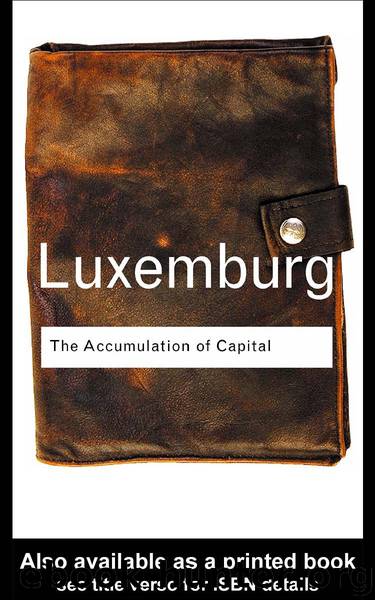The Accumulation of Capital by Rosa Luxemburg

Author:Rosa Luxemburg [Luxemburg, Rosa]
Language: eng
Format: epub
Tags: Finance, Business & Industry, Economics, HUM3TH, Business & Economics, Theory, MARXTOR
ISBN: 0415304458
Google: RzFQ96Kg5DsC
Amazon: B00AA29GY4
Publisher: Routledge
Published: 1971-01-02T00:00:00+00:00
* * *
The Accumulation of Capital
Last updated on: 12.12.2008
Rosa Luxemburg
The Accumulation of Capital
* * *
Section Two
Historical Exposition of the Problem
*
Second Round
The Controversy Between Rodbertus and von Kirchmann
Chapter 17
Rodbertus Analysis of Reproduction
To begin with, what does it mean that a decrease in the workers share is bound immediately to engender overproduction and commercial crises? Such a view can only make sense provided Rodbertus takes the national product to consist of two parts, vide the shares of the workers and of the capitalists, in short of v + s, one share being exchangeable for the other. And that is more or less what he actually seems to say on occasions, e.g. in his first Letter on Social Problems:
The poverty of the working classes precludes their income from giving scope to increasing production. The additional amount of products from the entrepreneurs point of view lowers the value of the aggregate product so far as to bar production on the former scale, leaving the workers at best to their accustomed straits, though, if it could be made available to the workers, it would not only improve their lot but would further act as a counterweight by increasing the value of what is retained by the capitalists (and so enable the latter to keep their enterprises at the same level).(1)
The counterweight which in the hand of the workers increases the value of what is retained by the entrepreneurs, can in this context only be the demand. Once again, we have landed happily at the familiar Ort of v. Kirchmanns where workers and capitalists exchange their incomes for the surplus product, and where the crises arise because variable capital is small and the surplus value large. This peculiar notion has already been dealt with above. There are other occasions, however, when Rodbertus advances a somewhat different conception. The interpretation of his theory in the fourth Letter on Social Problems is that the continual shifts in the relations of demand, evident in the share of the working class and caused by the share of the capitalist class, must result in a chronic disproportion between production and consumption.
What if the entrepreneurs endeavour to keep always within the limits of those shares, yet the shares themselves are all the time on the decline for the great majority of the society, the workers, decreasing gradually, unnoticeably, but with relentless force? What if the share of these classes is continually decreasing to the same extent as their productivity is increasing? Is it not really the fact that the capitalists of necessity organise production in accordance with the present volume of shares in order to make wealth universal, and that yet they always produce over and above this volume (of previous shares), thereby perpetuating dissatisfaction which culminates in this stagnation of trade?(2)
On this showing, the explanation of crises should be as follows: the national product consists of a number of common goods, as v. Kirchmann puts it, for the workers, and of superior goods for the capitalists. The wages represent the quantity of the former, and aggregate surplus value that of the latter.
Download
This site does not store any files on its server. We only index and link to content provided by other sites. Please contact the content providers to delete copyright contents if any and email us, we'll remove relevant links or contents immediately.
| Anarchism | Communism & Socialism |
| Conservatism & Liberalism | Democracy |
| Fascism | Libertarianism |
| Nationalism | Radicalism |
| Utopian |
The Secret History by Donna Tartt(16723)
The Social Justice Warrior Handbook by Lisa De Pasquale(11506)
Thirteen Reasons Why by Jay Asher(7833)
This Is How You Lose Her by Junot Diaz(5829)
Weapons of Math Destruction by Cathy O'Neil(5080)
Zero to One by Peter Thiel(4867)
The Myth of the Strong Leader by Archie Brown(4809)
Promise Me, Dad by Joe Biden(4478)
Beartown by Fredrik Backman(4465)
How Democracies Die by Steven Levitsky & Daniel Ziblatt(4448)
Stone's Rules by Roger Stone(4438)
The Fire Next Time by James Baldwin(4373)
100 Deadly Skills by Clint Emerson(4108)
A Higher Loyalty: Truth, Lies, and Leadership by James Comey(4059)
Rise and Kill First by Ronen Bergman(4045)
The David Icke Guide to the Global Conspiracy (and how to end it) by David Icke(3913)
The Farm by Tom Rob Smith(3895)
Secrecy World by Jake Bernstein(3808)
The Doomsday Machine by Daniel Ellsberg(3758)
